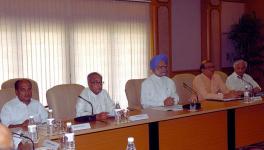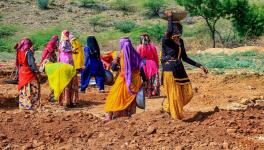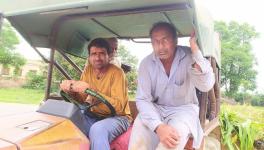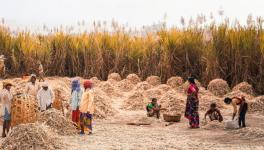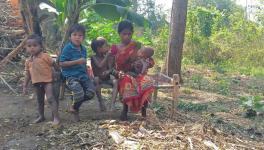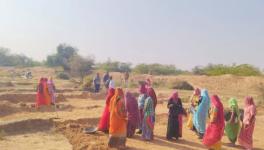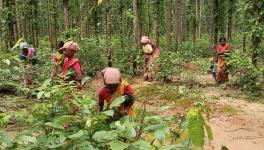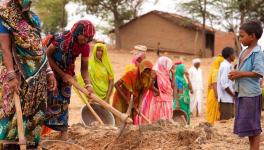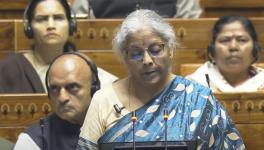COVID-19 in Rural India-VII: Unable to Sell Milk, Patiala Villagers Distribute for Free

Representational image. | Image Courtesy: Indian Iris
This is the seventh report in a series that provides glimpses into the impact of COVID-19-related policies on life in rural India. The series, commissioned by the Society for Social and Economic Research, comprises reports by various scholars who have been conducting village studies in different parts of India. The reports have been prepared on the basis of telephonic interviews with key informants in their study villages. This report describes the situation Hiana Kalan village in Patiala district in Punjab, where a break in the forward and backward linkages of village economy with the nearby urban region during the lockdown have led to several difficulties from financial losses to increased threat to food security. The farmers are also anxious about the harvesting of wheat and about not being able to transport produce to mandis.
The Hiana Kalan village in Punjab’s Patiala district has a population of nearly 1,100 (according to Anganwadi records). While a considerable population of the village consists of landless agricultural workers and landowning farmers, many of the village’s residents—both male and female— travel to nearby towns to work in non-agricultural occupations. In addition, the village includes landless agricultural workers and landowning farmers.
As noted above, several villagers travel outside the village to work in agro-based industrial units, grocery stores, medical stores, automobile repair workshops and petrol pumps. Some also work as plumbers, electricians and masons, while some female wage workers work as domestic workers in towns or at vegetable cultivation sites outside the territory of the village. The lockdown has had a severe impact on these workers—one of the respondents reported that due to being unable to travel to work during the lockdown, he and many others have entirely lost their daily earnings.
The farmers in the village primarily grow wheat in the rabi season, and as such are concerned about the wheat harvesting season, which usually begins in mid-April. They also grow vegetables, although these are mostly for household consumption. One of the respondents is engaged in vegetable farming and reported incurring huge losses through the lockdown period as he has been unable to transport his produce to sell it at the mandi. Landless agricultural workers, who depend on being employed within the village by landowning households, however, have not been adversely affected as such.
Another essential commodity that the village produces is milk. A significant share of the milk is bought by middlemen twice a day, who then sell it at milk booths in urban areas. The remaining milk is either sold to other households within the village who do not own their own livestock or is used by milk-producing households themselves. According to one of the respondents, the middlemen refused to buy milk on the first two days of the lockdown due to the closure of urban milk booths. Milk-producing households lost all revenue they would have received from sales of milk without any reduction in input cost; several of them even had to distribute the milk for free. From the third day of the lockdown, the middlemen began buying milk again, but they only did so once a day, in the morning but not in the evening. The price of milk has also subsequently fallen and livestock owners have lost half of their income.
As far as MGNREGA scheme is concerned, a panchayat member reported that although there are more than a hundred households registered under this scheme, workers have not been given work for even a single day since the lockdown began.
Access to essential services such as banking have also been impacted by the lockdown. There is a commercial bank three km away from the village, but access to an ATM has almost become impossible due to the lockdown. Thus, although the state government has credited old age and widows’ pensions to their bank accounts, the beneficiaries have not been able to withdraw the cash from the bank.
Most of the households in the village are dependent on local grocery shops and hawkers for essential groceries. For the first few days after the lockdown had been declared, most shopkeepers in the village had shut shop, and hardly any hawkers were allowed to visit the village to sell vegetables and other consumer durables. Two days later, even though the shopkeepers reopened their shops, they refused to sell anything on credit—a common practice before the lockdown began. The prices of sugar, pulses and flour were reported to have increased; one of the respondents, who owns a grocery shop, explained that the prices of all essential items at the wholesale market have also increased. The administration has permitted a vegetable vendor to sell vegetables in the village only in the morning, but these, too, are being sold at higher rates than before.
Not only that, distribution of grains through PDS has also not been adequate. Five kg of wheat per person per month have been supplied to only 426 inhabitants of the village. Amid the lack of adequate relief and delays in distribution, NGOs and youth organisations have stepped in. A number of families facing an immediate shortage of food were provided rations by a youth group in the village called ‘Kaar-Sewa’. Welfare Society Nabha, an NGO, was also reported to have distributed rations to poor households in the village.
Our respondents also reported a shortage of essential medications for those with conditions like high blood pressure and diabetes. Elderly individuals in need of medical assistance have been unable to get medications and treatment. There have been no visits by representatives of the local or state governments to educate the villagers on COVID-19. However, the sanitisation of all streets in the village has been undertaken by the Prabandhak (managing) Committee of the village Gurudwara.
With the break in the forward and backward linkages of village economy with the nearby urban region, the villagers in Hiana Kalan have experienced a number of difficulties during the lockdown from financial losses to increased threat to food security. The farmers are also anxious about the harvesting of wheat and about not being able to transport produce to mandis.
[This article is based on telephonic interviews with ten participants (one from each of the seven wards of the village, as well as a panchayat member, a shopkeeper and a street vendor) were conducted between 30 and 31 March, 2020.]
The author is a PhD Research Scholar at Punjabi University in Patiala.
Also read: COVID-19 in Rural India –VI: No Jobs or Payments as Powerlooms Fall Silent in Tiruppur
Get the latest reports & analysis with people's perspective on Protests, movements & deep analytical videos, discussions of the current affairs in your Telegram app. Subscribe to NewsClick's Telegram channel & get Real-Time updates on stories, as they get published on our website.









